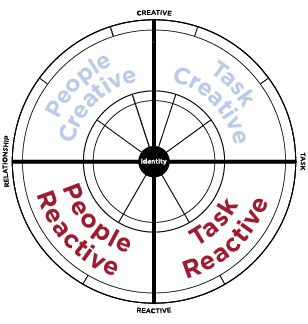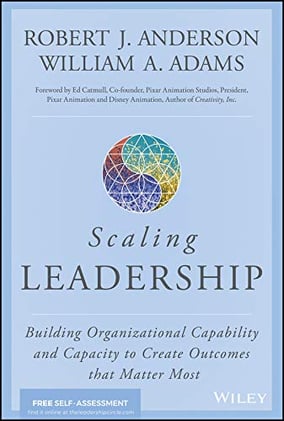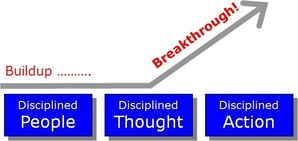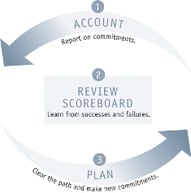 The number-one reason for failure of vision and strategy is ineffective leadership, both individual and collective.
The number-one reason for failure of vision and strategy is ineffective leadership, both individual and collective.
Leadership is a primary contributor to organizational performance. In Scaling Leadership you distinguish how good leaders' strengths differ from poor leaders. Reactive leaders liabilities in people and tasks, cancel out strengths, while Creative Leaders' People and Tasks strengths multiply and grow an organization.
The Leadership Circle brings clarity to why, as a leader, you either grow and excel, or your liabilities cancel out your strengths.
When an extremely talented leader reaches his or her limits, Scaling Leadership authors Anderson and Adams' years of working with this type of leader leads them to conclude these limits are within their inner game.
.png?width=300&name=Jeff%E2%80%99s%20First%20Leadership%20Profile%20(2007).png) Chapter 8 provides an example of one leader’s journey to be a more effective leader.
Chapter 8 provides an example of one leader’s journey to be a more effective leader.
The graphs here show how this leader started out creative, moved to reactive, and then back to creative over the course of 6 years.
The bold lines in the 3rd profile represent the height of his scores from the first profile. In most cases, his 3rd profile exceeds his first.
His Leadership Effectiveness represented by the bottom bar graph moved from an 80 percentile, dropped to just over 30 percentiles (2nd profile), back to 70th percentile in the 3rd.png?width=283&name=Jeff%E2%80%99s%20First%20Leadership%20Profile%20(2007).png) profile. (Discover more by reading the full chapter.)
profile. (Discover more by reading the full chapter.)
Leadership is a crucible. The moment you start to work on your effectiveness as a leader, you begin to improve your effectiveness as a human being.
.png?width=322&name=Jeff%E2%80%99s%20Third%20Leadership%20Profile%20(2013).png) The Inner Game of Tennis
The Inner Game of Tennis
"The Inner Game of Tennis" is a revolutionary book for overcoming the self-doubt, nervousness, and lapses of concentration preventing a player from winning. First published in 1974, I recall reading it when I began to play and work on improving my tennis game.
The book helped my tennis game, and more importantly, made me realize how my mental state enabled me to deliver peak performance. It revealed how you can cultivate this state in sports, work, and life. The discovery process helped me become a lifelong learner, opening the game within me, which, until this point, I’d not been developing effectively.
 Scaling Leadership explains, “Inherently, leadership becomes a kind of spiritual boot camp. The very pressure success, scale, and complexity bring is a force for our own transformation and evolution. It’s essentially a spiritual process. When we step into a position of leadership, we step into a transformative crucible. The crucible metaphor comes from alchemy. It is the container in which enough heat and pressure build-up to catalyze a transformation—for example, transforming lead into gold.
Scaling Leadership explains, “Inherently, leadership becomes a kind of spiritual boot camp. The very pressure success, scale, and complexity bring is a force for our own transformation and evolution. It’s essentially a spiritual process. When we step into a position of leadership, we step into a transformative crucible. The crucible metaphor comes from alchemy. It is the container in which enough heat and pressure build-up to catalyze a transformation—for example, transforming lead into gold.
By its nature, leadership will push us to our limits—and maybe beyond them. It will call on the highest and best of who we are and what we offer to meet the daily challenges we face
Because our humanity is ultimately the foundation of our leadership, these paths are inseparable. This puts us right in the middle of a spiritual path.
This choice calls on the highest and deepest within us. We are challenged to become higher versions of ourselves—to mine our true human greatness and put it in service of others.
 The choice to be a more effective leader means facing our development gaps. Amid the current complexity, we can not be in over our heads.
The choice to be a more effective leader means facing our development gaps. Amid the current complexity, we can not be in over our heads.
Escalating complexity is a benevolent force on every leader, relentlessly pressing us with our need to develop. Like a drill sergeant in our spiritual boot camp, it aims to evolve us.
There is no shame in having development gaps. We all have them. Welcome to the human race and to leadership. We can and must extend compassion for ourselves and others while facing the steepness of our learning curve, both individually and collectively.
If we risk being radically human and lead by learning out loud with our colleagues, there is plenty of grace, forgiveness, and compassion in the system—and support from those around us.
At its essence, leadership is a calling to serve. In a world increasingly at risk, leadership is a vocation that can link diverse people from all walks of life to create remarkable achievements.
Leadership is the deployment of self into circumstances. As a leader, you are your primary asset. How you show up moment to moment is your leadership impact.”
In Scaling Leadership, you are asked these key questions: When you lead, who shows up? Which self do you deploy?
Leadership Explained
Want to understand Leadership better? I found this video on Leadership by Simon Sinek particularly helpful.
To create an environment where everyone is inspired to give their best, contact Positioning Systems today to schedule a free exploratory meeting.
Growth demands Strategic Discipline.
 Building an enduring great organization requires disciplined people, disciplined thought, disciplined action, superior results, producing a distinctive impact in the world.
Building an enduring great organization requires disciplined people, disciplined thought, disciplined action, superior results, producing a distinctive impact in the world.
Discipline sustains momentum, over a long period of time, laying the foundations for lasting endurance.
 A winning habit starts with 3 Strategic Disciplines: Priority, Metrics, and Meeting Rhythms. Forecasting, accountability, individual, and team performance improve dramatically.
A winning habit starts with 3 Strategic Disciplines: Priority, Metrics, and Meeting Rhythms. Forecasting, accountability, individual, and team performance improve dramatically.
Meeting Rhythms achieve a disciplined focus on performance metrics to drive growth.
Let Positioning Systems help your business achieve these outcomes on the Four most Important Decisions your business faces:
|
DECISION |
RESULT/OUTCOME |
|
PEOPLE |
|
|
STRATEGY |
|
|
EXECUTION |
|
|
CASH |
|
Positioning Systems helps mid-sized ($5M - $250M+) businesses Scale-UP. We align your business to focus on Your One Thing! Contact dwick@positioningsystems.com to Scale Up your business! Take our Four Decisions Needs Assessment to discover how your business measures against other Scaled Up companies. We’ll contact you.
.jpg?width=308&name=The%20Peter%20Principle%20(sketchplantations.com).jpg) NEXT BLOG – Is the Peter Principle accurate?
NEXT BLOG – Is the Peter Principle accurate?
Are people promoted to their highest level of incompetence? Scaling Leadership authors believe there’s some truth to this, however, their experience and data support the belief leaders don’t cap out so much on their level of competence, but rather their level of development. Their inner game reaches its Peter Principle. They need to evolve. Next blog we examine the Peter Principle a universal path of development to evolve your leadership.






.jpeg?width=150&height=135&name=Hand%20with%20marker%20writing%20the%20question%20Whats%20Next_%20(1).jpeg)

